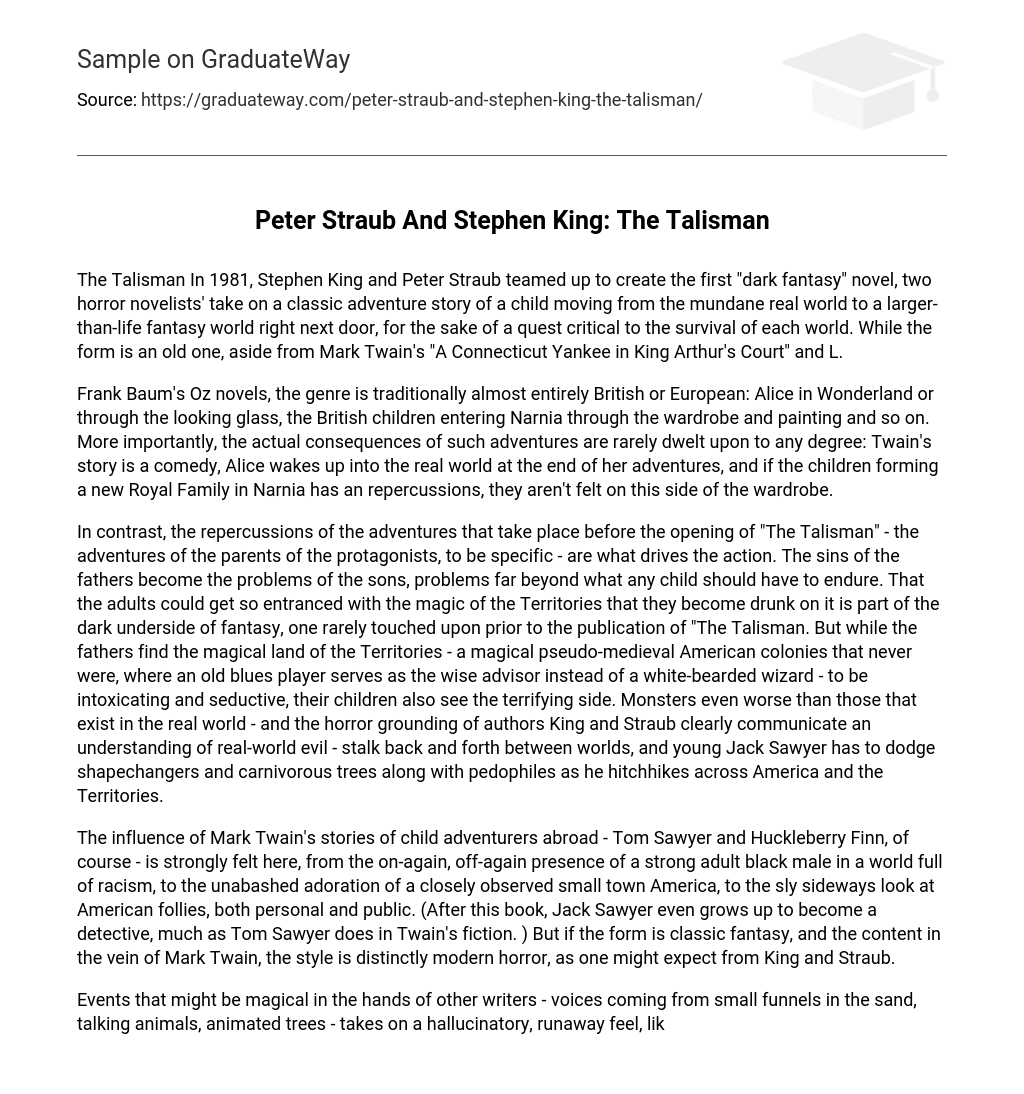The Talisman In 1981, Stephen King and Peter Straub teamed up to create the first “dark fantasy” novel, two horror novelists’ take on a classic adventure story of a child moving from the mundane real world to a larger-than-life fantasy world right next door, for the sake of a quest critical to the survival of each world. While the form is an old one, aside from Mark Twain’s “A Connecticut Yankee in King Arthur’s Court” and L.
Frank Baum’s Oz novels, the genre is traditionally almost entirely British or European: Alice in Wonderland or through the looking glass, the British children entering Narnia through the wardrobe and painting and so on. More importantly, the actual consequences of such adventures are rarely dwelt upon to any degree: Twain’s story is a comedy, Alice wakes up into the real world at the end of her adventures, and if the children forming a new Royal Family in Narnia has an repercussions, they aren’t felt on this side of the wardrobe.
In contrast, the repercussions of the adventures that take place before the opening of “The Talisman” – the adventures of the parents of the protagonists, to be specific – are what drives the action. The sins of the fathers become the problems of the sons, problems far beyond what any child should have to endure. That the adults could get so entranced with the magic of the Territories that they become drunk on it is part of the dark underside of fantasy, one rarely touched upon prior to the publication of “The Talisman. But while the fathers find the magical land of the Territories – a magical pseudo-medieval American colonies that never were, where an old blues player serves as the wise advisor instead of a white-bearded wizard – to be intoxicating and seductive, their children also see the terrifying side. Monsters even worse than those that exist in the real world – and the horror grounding of authors King and Straub clearly communicate an understanding of real-world evil – stalk back and forth between worlds, and young Jack Sawyer has to dodge shapechangers and carnivorous trees along with pedophiles as he hitchhikes across America and the Territories.
The influence of Mark Twain’s stories of child adventurers abroad – Tom Sawyer and Huckleberry Finn, of course – is strongly felt here, from the on-again, off-again presence of a strong adult black male in a world full of racism, to the unabashed adoration of a closely observed small town America, to the sly sideways look at American follies, both personal and public. (After this book, Jack Sawyer even grows up to become a detective, much as Tom Sawyer does in Twain’s fiction. ) But if the form is classic fantasy, and the content in the vein of Mark Twain, the style is distinctly modern horror, as one might expect from King and Straub.
Events that might be magical in the hands of other writers – voices coming from small funnels in the sand, talking animals, animated trees – takes on a hallucinatory, runaway feel, like the reader is falling down a well, or riding a roller coaster no longer under the control of the operator. While the adventure may have begun, in part, with self-determination on the part of 12-year-old Jack Sawyer to save the life of his cancer-ridden mother, he soon is in over his head, sucked relentlessly from one danger to another, both mundane and magical.
The violence and danger he faces are conveyed with a visceral reality, enough to make the reader flinch and wince in sympathetic pain. Countless dark fantasy writers have further explored the realms charted out by King and Straub in the years since, and both fantasy and horror novels have had their mutual boundaries smudged since – there are even romance novels that operate in this sort of milieu now – but to read “The Talisman” is to go back to the spring from whence the stream first began to flow.
And like Jack Sawyer finds whenever he “flips” over to the Territories, all the flavors and scents are stronger here, of “such purity and sweetness that you might imagine a man could smell a radish pulled out of the ground a mile away. ” Strongly recommended to anyone who ever loved a fantasy adventure tale, even if – or perhaps especially if – you long ago put aside such childhood things.





